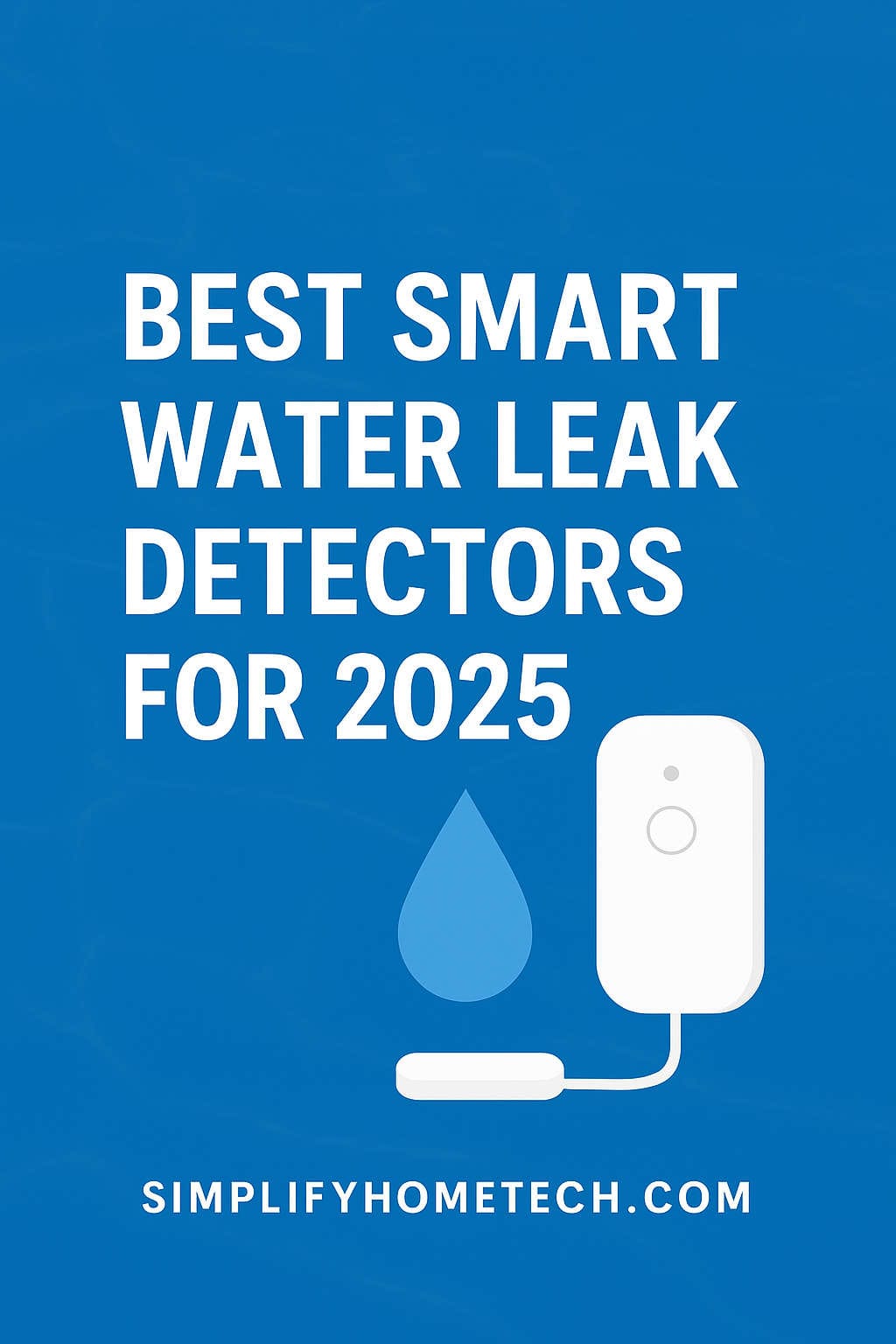Water is essential for life — but in the wrong place, at the wrong time, it can be one of the most destructive forces in your home. A small leak from a washing machine hose or a hidden pipe crack can cause thousands of dollars in damage within hours. And unlike fire or burglary, water damage often goes unnoticed until it’s too late.
Smart water leak detectors are one of the simplest and most effective ways to protect your property. Whether you rent an apartment or own a multi-story home, these devices can give you instant alerts, trigger alarms, and even shut off your water automatically when a leak is detected.
In 2025, the technology is smarter, more reliable, and more affordable than ever. This guide will walk you through the best smart water leak detectors available this year, explain the pros and cons of each, and help you choose the right solution for your needs.
Why You Need a Smart Water Leak Detector
Water damage can happen for dozens of reasons: a burst pipe in winter, a faulty dishwasher connection, a leaking water heater, or even a cracked toilet tank. Traditional leak detection relies on noticing the problem yourself — usually when you see water pooling or hear a strange drip. By then, the damage has often begun.
A smart water leak detector changes the game by:
- Alerting you immediately via smartphone notifications, even if you’re away.
- Sounding a loud local alarm so anyone at home can react quickly.
- Detecting leaks in hidden areas before they spread.
- Automatically shutting off your water supply in advanced models.
- Reducing insurance costs by preventing catastrophic damage.
According to insurance industry reports, the average water damage claim can range between $5,000 and $15,000, with severe cases costing far more. A relatively inexpensive leak detector can pay for itself in a single incident.
Types of Smart Leak Detection Systems
Before jumping into product recommendations, it’s important to understand the two main types of systems available:
1. Point-of-Use Sensors
These are small battery-powered devices placed in strategic spots — under sinks, next to washing machines, near water heaters, and other high-risk areas. They trigger alerts when they detect moisture.
Pros:
- Inexpensive and easy to install.
- Flexible placement — you can cover multiple areas.
- No plumbing work required.
Cons:
- Only detect leaks where they are placed.
- Won’t catch hidden leaks behind walls or underground.
2. Whole-Home Flow Monitoring Systems
These devices are installed on your main water line and measure flow, pressure, and temperature to detect unusual patterns. Some models can automatically shut off your water supply.
Pros:
- Can detect leaks anywhere in your plumbing system.
- Identify hidden leaks you can’t see.
- Often include detailed water usage analytics.
Cons:
- More expensive than point sensors.
- Usually require professional installation.
- May need Wi-Fi for remote alerts.
How We Chose the Best Smart Leak Detectors for 2025
To compile this list, we looked at:
- Detection speed and accuracy — How quickly the device notices a leak.
- Reliability — Consistent performance over time without false alarms.
- Smart home compatibility — Works with systems like Alexa, Google Home, HomeKit, SmartThings, or Matter.
- Ease of installation — Simple for DIY or requires professional help.
- Automatic shutoff capability — For higher-end models.
- Price-to-performance ratio — Best value for the features offered.
Best Smart Water Leak Detectors for 2025
1. Flo by Moen Smart Water Monitor & Automatic Shutoff
Best for: Whole-home protection
Flo by Moen is a leader in leak detection technology, offering a device that not only monitors water flow but can also shut off your main water supply if it detects suspicious activity. It uses sensors to measure water pressure, flow rate, and temperature to identify leaks — from major bursts to slow drips.
Key Features:
- Continuous 24/7 monitoring of your entire plumbing system.
- Automatic shutoff to prevent major damage.
- Detailed water usage insights via mobile app.
- Can detect leaks as small as a drop per minute.
Pros:
- Protects your entire home, not just specific spots.
- Can prevent catastrophic flooding if a major pipe bursts.
- May qualify for home insurance discounts.
Cons:
- High upfront cost.
- Professional installation recommended.
2. Phyn Plus (2nd Gen)
Best for: Premium leak detection with advanced analytics
Phyn Plus takes leak detection to the next level by using micro-pressure wave analysis to detect leaks anywhere in your plumbing system. This means it can even identify issues behind walls or underground before water surfaces.
Key Features:
- Extremely precise leak detection technology.
- Automatic shutoff capability.
- Daily diagnostic tests of your plumbing.
- Works with Alexa and Google Assistant.
Pros:
- Ideal for large homes or those in cold climates.
- Can detect issues that cheaper sensors miss.
- Adds a layer of preventative maintenance.
Cons:
- One of the more expensive options.
- May require professional installation.
3. Govee Wi-Fi Water Sensor
Best for: Budget-friendly spot protection
For renters or those looking for affordable coverage, Govee offers an excellent water sensor that’s easy to set up and use. Place it under sinks, behind toilets, or next to appliances, and you’ll get both an audible alarm and smartphone notifications when moisture is detected.
Key Features:
- Loud 100dB local alarm.
- App notifications for remote alerts.
- Long battery life.
- Multi-pack options for affordable coverage.
Pros:
- Very budget-friendly.
- Easy DIY setup.
- Ideal for apartments or small homes.
Cons:
- Only detects water where it’s placed.
- No automatic shutoff feature.
4. Aeotec Water Sensor 7
Best for: Smart home power users
If you already have a Z-Wave smart home system (like SmartThings or Hubitat), the Aeotec Water Sensor 7 integrates seamlessly. It’s compact, highly sensitive, and can be paired with other smart devices to trigger automated responses.
Key Features:
- Works with Z-Wave hubs for advanced automation.
- Extremely sensitive detection.
- Probe options for hard-to-reach areas.
- Long battery life.
Pros:
- Perfect for smart home enthusiasts.
- Can be integrated with automated shutoff valves.
- Discreet and versatile design.
Cons:
- Requires a Z-Wave hub.
- More expensive than basic Wi-Fi sensors.
5. Aqara Leak Sensor + Smart Valve Controller T1
Best for: Affordable smart shutoff with Matter compatibility
Aqara’s leak sensors are small, reliable, and now compatible with the Matter smart home standard, making them future-proof. Pair them with the Aqara Smart Valve Controller T1 to automatically shut off your water supply when a leak is detected.
Key Features:
- Matter compatibility for broad smart home integration.
- Affordable automatic shutoff option.
- Easy DIY installation for many valve types.
- Works seamlessly with Aqara’s ecosystem.
Pros:
- Lower cost than traditional shutoff systems.
- Great option for DIYers.
- Expanding compatibility with major smart platforms.
Cons:
- May not fit all valve sizes — check before buying.
- Relatively new in the market, so long-term reliability is still being proven.
Other Noteworthy Options
- Eve Water Guard — Ideal for Apple HomeKit users, with a long sensing cable for wide coverage.
- First Alert/Resideo Leak Detectors — Trusted brand with loud alarms and freeze detection.
- Wyze Leak Sensor & Probe — Affordable, works with Wyze ecosystem, and offers probe options for sump pumps or tight spaces.
Where to Place Leak Detectors in Your Home
For maximum effectiveness, place sensors in these high-risk areas:
- Under sinks and behind toilets.
- Next to washing machines and dishwashers.
- At the base of water heaters.
- Near sump pumps and in basements.
- Behind refrigerators with water dispensers.
- In crawlspaces or utility rooms.
Installation Tips
- Point Sensors: Simply place them flat on the floor where water would naturally pool. Test with a small amount of water to ensure they trigger properly.
- Whole-Home Systems: These typically require cutting into your main water line, so professional installation is recommended unless you have plumbing experience.
- Smart Integration: If using with a smart home hub, set up automations — for example, have your lights flash or a siren sound when a leak is detected.
Avoiding False Alarms
- Keep sensors away from areas with frequent harmless drips or condensation.
- Use probe models for sump pits to avoid triggering from splashes.
- Adjust sensitivity settings if your device supports it.
Maintenance Checklist
- Test each sensor monthly with a small splash of water.
- Replace batteries as needed — most last 1–3 years.
- Keep sensors clean and dry when not in use.
- Update firmware regularly for the latest features and bug fixes.
Cost Breakdown
- Basic point sensors: $15–$60 each.
- Mid-range smart sensors: $50–$200.
- Whole-home systems with shutoff: $400–$1,000+ including installation.
Real-World Scenarios
For Renters: A few affordable Govee or Wyze sensors placed in the kitchen, bathroom, and near laundry appliances offer great coverage without installation hassles.
Homeowners: Combine a whole-home system like Flo or Phyn with point sensors in high-risk areas for total protection.
Tech Enthusiasts: Use Aeotec or Aqara sensors with your smart hub to trigger custom automations — like shutting off a valve, sending text alerts, or even recording video from nearby security cameras.
Frequently Asked Questions
Do I need Wi-Fi for these devices?
Most smart leak detectors require Wi-Fi or a smart hub to send alerts to your phone, but they’ll still trigger a local alarm without internet.
Can I install a whole-home system myself?
If you’re comfortable with plumbing and cutting into your main water line, yes — but most people hire a professional.
How often should I test my sensors?
Monthly testing ensures they’re still functioning and helps you spot any battery issues early.
Will these work if the power goes out?
Battery-powered sensors will still work. Whole-home systems with motorized shutoff valves may require backup power for remote alerts.
Final Thoughts
In 2025, there’s a smart water leak detector for every budget and home type.
- For maximum protection, go with a whole-home monitor like Flo by Moen or Phyn Plus.
- For affordable spot coverage, Govee offers unbeatable value.
- For smart home integration, Aeotec and Aqara are excellent choices.
No matter which you choose, the peace of mind you gain — knowing you can prevent costly water damage — is worth the investment.
You might also like,
- How to Flush a Water Heater Step-by-Step (DIY Guide for Homeowners)
- How to Fix Low Water Pressure in Your Home: Simple DIY Solutions That Work
- Top 10 Plumbing Maintenance Tips for 2025 | Save Money & Prevent Problems
- Choosing the Right Water Heater for Your Home: Everything You Need to Know
- Understanding Gas Control Valves in Water Heaters: Complete Troubleshooting & Repair Guide

